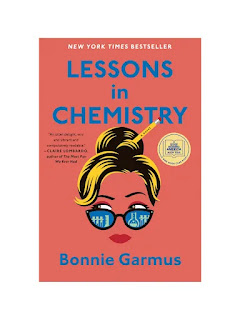LESSONS IN CHEMISTRY (2022)
By Bonnie Garmus
Doubleday, 386 pages
★★★★★
Lessons in Chemistry is the delightful debut of novelist Bonnie Garmus. At heart it’s a feminist fantasy, but an unorthodox one. It’s hysterical in places, poignant in others, and anchored by Elizabeth Zott, whose stubbornness, opinionated ways, and uncompromising behavior are her greatest strength and greatest weakness.
It really is about chemistry, both the laboratory and interpersonal varieties. It is set in the 1950s and early 1960s, when “hard” subjects such as science are the preserve of men. Women, it was assumed, were unfit for such fields. Elizabeth’s problem is that “I’m a chemist” is her personal mantra. She has had the misfortune of being victimized by those whose moral compass is akin to a fuel gauge pointing toward E. Her parents were hucksters, she was sexually assaulted by her academic advisor, and never finished her degree. In the eyes of most she’s not a real chemist, though some realize she is brilliant and can’t wait to steal her research.
Perhaps this doesn’t sound like a barrel of laughs. You might continue to think that when she lands a job at the otherwise all-male Hastings Research Institute lab headed by the sleazy Dr. Donatti who pays her a fraction of what others are making, including some of the female support staff. Zott doesn’t do herself any favors, though. She has few filters, a barbed tongue, and backs down to no one. Donatti would be happy to cherry-pick her notes and get rid of her except for a major complication: Calvin Evans.
Evans has also been kicked around, including being raised in a Catholic orphanage in Iowa headed by a priest who is Donatti’s equal on the reprehensibility scale. Evans grows up tall, gawky, and geeky—perfect chemistry material. He too lands at Hastings, allegedly because its California location was good for his one non-Bunsen burner passion: rowing. Make that two. After a few comic misfires, he’s in love with the beautiful Elizabeth. She reciprocates because, in her words, he was “the first man to take me seriously.” Calvin knows what Donatti refuses to see; Zott is the smartest thing in the lab and that might include him, though he is a perennial Nobel Prize nominee. If Donatti wants to keep Evans, who is routinely courted by Harvard and others, Zott is part of the package.
Elizabeth comments, “Calvin and I were soulmates.” Label them socially transgressive ones. He’d love to marry her, but she wants no part of that institution, though she’s happy to live with him and enjoy a carnal relationship. In the 1950s, that’s practically an un-American breach of morality. Like Elizabeth cares. At some point she and Calvin acquire a stray mutt they name Six-Thirty and Zott begins to keep track of the number of words he knows. The pooch will become a major character in his own right. Elizabeth also obtains a daughter, Mad, under less-than-ideal circumstances and raises her to be as forceful and bold as she. Mad’s encounters with her less-intelligent kindergarten teacher are side-splitting.
Mad is often called Madeline, but her given name really is Mad. There’s an amusing backstory to that as well, but even wackier is the avenue through which Elizabeth gains credibility. At some point, Donatti manages to jettison Elizabeth. Because she needs the money, Zott is convinced to try her hand at a cooking show, on her own terms of course. She has the right look, but she’s a serious as a preacher, refuses to go girly on the air, and insists that her cooking show be about chemistry! When she cooks, she adds NaCl, not salt, and speaks of how it helps build covalent bonds. Against all odds, the show is a smash hit and now it’s the station head who wants her gone. Why? Because she also tells women that they are exploited and voices her opinions on whatever she deems logical, no matter who is shocked by it. The past and the present will collide in what passes for a happy ending in this offbeat novel. I shall say only that Zott’s ever-present yellow pencil is outdone by a pen and several women whose pluck rivals Elizabeth’s.
I emphasize that this is fiction, not a tale “based on a true story,” as that hackneyed phrase goes. Call it the history that should have been and is only believable because of social changes that subsequently occurred. If you prefer, though, you can just surrender to the fantasy, enjoys some laughs, and revel in characters who punch above their weight class and win.
Rob Weir




No comments:
Post a Comment